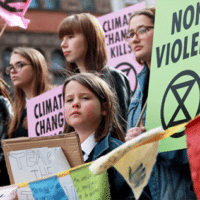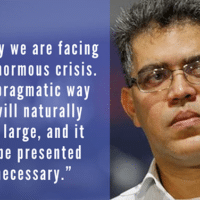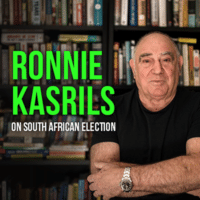-
Traditional measures of unemployment are missing the mark
We’ve heard it countless times in recent media accounts: The economy is at “full employment.” The most recent jobs numbers, out the first week in May, show the official unemployment rate, and applications for unemployment benefits are at a 50-year low. The last time a recovery was able to push the unemployment rate to these […]
-
Students from 1,600 cities just walked out of school to protest climate change. It could be Greta Thunberg’s biggest strike yet
Hundreds of thousands of students around the world walked out of their schools and colleges Friday in the latest in a series of strikes urging action to address the climate crisis. According to event organizers Fridays for Future, over 1664 cities across 125 countries registered strike actions, with more expected to report turnouts in the coming days.
-
As the far-right wins Indian elections, progressive forces vow to resist
The modern global economy, essentially guarantees the continued expatriation of profits and natural assets from resource-rich but capital-poor countries, facilitating the enrichment of the global economic elite and Multinational Corporations (MNC), at the expense of developing countries. To elaborate on the themes of corporate plunder, resource nationalism and people-centered forms of resource management, Tricontinental: Institute for Social Research spoke with Gyekye Tanoh, head of the Political Economy Unit at the Third World Network-Africa based in Accra (Ghana).
-
Review of Alan Nasser’s, Overrripe Economy
Alan Nasser has written a masterful book, one that belongs in every serious leftist and socialist library, and one that certainly deserves to be widely and extensively read.
-
The dogs of war are unchained once more
This week’s newsletter features an open letter to the President of Indonesia, written by Khamid Istakhori, General Secretary of Federasi SERBUK–a large trade union federation in Indonesia. He asks President Jokowi to use Indonesia’s presidency of the UNSC to denounce violations of international law against Venezuela.
-
First strike
To help this movement win, we should ask why others lost. We should ask, for example, why Occupy, despite the energy and sacrifices of so many, came to an end, while the institutions it confronted remain intact.
-
Defending Chavez’s project today
I began to work directly with Comandante Hugo Chavez in May 1996. By that time, Chavez was already exploring the idea of participating in elections.
-
The Yellow Vests of France: six months of struggle
What if they succeed? We know what the ‘success’ of structured parties like Syriza in Greece and Podemos in Spain led to. Maybe a horizontal federation of autonomous base-groups attempting to re-invent democracy could do better.
-
Scientists against the machine
Jane Shallice examines the history of radical research at the British Society for Social Responsibility in Science.
-
Ronnie Kasrils on South African election
As the curate said, assessing a none-too-fresh boiled egg at breakfast: ‘It was good in parts.’
-
The plot to kill Venezuela
Vijay Prashad looks at the purpose and impact of sanctions against Venezuela.
-
Ellen & Rachel Meeropol and Boots Riley on art and resistance
Ellen Meeropol is the author of two novels about law, justice, and government surveillance. Her most recent book, “On Hurricane Island,” explores a fictional secret domestic detention camp for citizens.
-
The great work
This isn’t really capitalism as we used to know it. My father and mother had a restaurant. That’s capitalism. What’s taken over now is big corporate capitalism.
-
Media stenography turns beheaded Saudi protesters into ‘terrorism’
All three outlets also added gratuitous details about the attack in Sri Lanka and/or other ISIS-related attacks–attacks that there’s no suggestion any of the defendants were connected to. In fact, most of these defendants were arrested before ISIS existed. And a majority of those killed, being Shiites, would be viewed by ISIS as heretics.
-
The planet is on fucking fire
Nye promptly did, with what Oliver admiringly called ” an entirely appropriate amount of profanity.” “By the end of this century, if emissions keep rising, the average temperature on Earth could go up another four to eight degrees,” said Nye, growing agitated. “What I’m saying is the planet is on fucking fire.”
-
We are the shadow-ghosts, creeping back as the camp fires burn low
Professor Sandra Díaz, who teaches in Argentina’s National University of Cordoba and is the co-chair of the IPBES report, said that although bio-diversity and eco-diversity are ‘declining fast’, ‘we still have the means to ensure a sustainable future for people and the planet’.
-
“There is no alternative” to managing the economy and the climate
The United States is the country most easily positioned to address climate change but it has done likely the least out of any rich country. China, a country significantly less wealthy than the United States, has likely done the most. In fact, a recent study provides some evidence that China’s carbon dioxide emissions peaked in 2013 and are declining in large part due to changes in China’s industrial structure, which includes pilot programs for pricing carbon, among many other things.
-
Colored Property & State Debt with David Freund
In this episode, we talk with David Freund, associate professor of history at the University of Maryland. David is the author of Colored Property: State Policy and White Racial Politics in Suburban America, an award-winning book that tracks how the language of racial exclusion was re-coded in terms of markets, property, and citizenship in the post-World War II era.
-
Warnings of ‘Gulf of Tonkin 2.0’ as Trump officials blame Iran for oil tanker attacks
It’s obvious that Bolton and Pompeo are trying to create a Gulf of Tonkin incident with Iran.
-
Making excuses for unemployment: The myth of a “skills gap”
The current labor force participation rate of prime age workers, those 25-54 years, is a case in point. It remains below the previous peak rate in 2008, and even further below the peak rate at the turn of the century. We would need an additional 1.2 million employed prime age workers to match the 2008 labor force participation rate and 2.5 million more to match the turn of the century rate. Still it appears that at the present moment unemployment is no longer a major political issue.




















